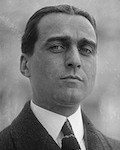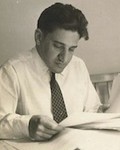Thomas E. Dewey (1902-1971), governor of New York and unsuccessful Republican presidential nominee, was the first candidate for the White House to raise the Nazi persecutions and Zionism as campaign issues.
Dewey declared March 9, 1943, the opening of the Bergson Group’s We Will Never Die pageant in New York City, as a day of mourning for European Jewry. The following month, he issued a statement calling for international action “to help in every way possible in saving the Jews of Europe from extermination.”
By the autumn of 1943, in view of the likelihood that Dewey would be the GOP’s next presidential nominee, some prominent Democrats began to worry he would adopt a pro-Zionist position to lure Jewish votes away from President Roosevelt, especially in the crucial electoral state of New York. Dewey “has lots of political canniness… he would steal the show right from under our noses,” Congressman Emanuel Celler warned White House aides.
In the days leading up to the June 1944 Republican national convention, Dewey approved a proposal by Jewish activists to include a plank in the party platform calling for rescue of refugees from the Nazis and establishment of a Jewish state in Palestine. It marked the first time either major political party made those positions part of their official platform, and prompted the Democrats, at their 1944 convention, to adopt similar language. Nonetheless, Dewey received only about 10% of the Jewish vote in his race against President Franklin D. Roosevelt that year.
After the war, Dewey repeatedly called on Great Britain to permit the immigration of Holocaust survivors to Palestine and the creation of a Jewish state there. The expectation of a major Dewey statement on the subject in the autumn of 1946, and its possible impact on the midterm congressional elections, was a major factor in spurring President Harry Truman to issue his first-ever public statement supporting establishment of a Jewish state. In the 1948 presidential race, Dewey won about 28% of the Jewish vote nationwide, and about 22% of Jewish votes in New York State.
Sources: Wyman, The Abandonment of the Jews, pp. 88, 172-183;
Medoff, FDR and the Holocaust, pp. 214, 218-219.











